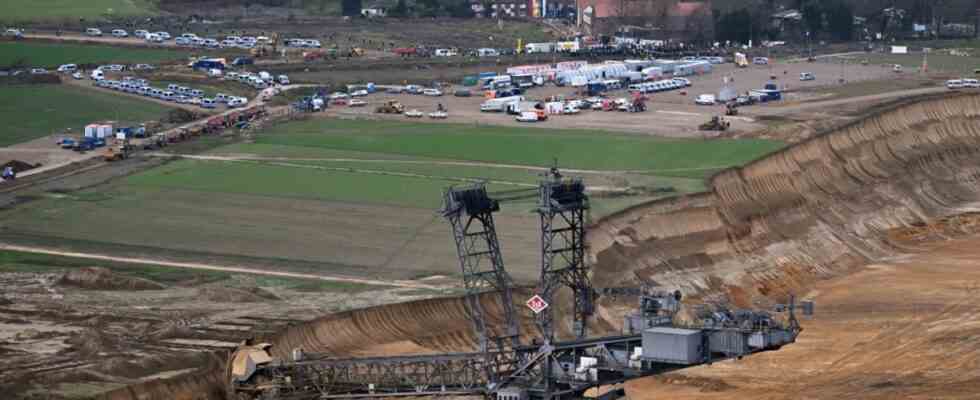It’s too late for dialogue, for a real conversation on this Tuesday evening. All participants in the citizens’ meeting in Erkelenz suspect that – ten, twelve, maybe 14 hours before the very likely start of the evacuation of Lützerath, the protest village on the edge of the demolition. The hamlet, which the climate movement has declared the German 1.5-degree limit, belongs to the 43,000-inhabitant town in the Rhenish lignite mining area. Which is why the police and local politicians invited people to the futuristic auditorium of the local vocational college. To quarrel before the storm.
More than 200 citizens came. Some are signaling with colorful flags that they are for “100% renewables”, i.e. for wind and solar – against coal. Others wear yellow crosses on their lapels, emblems of the opponents of lignite, who have been defending their villages against the excavators for years. And that almost everyone is sitting in the stalls that evening to once again prove their anger at RWE, their protest against coal and evictions – that becomes clear at the latest when Stephan Pusch takes the floor on stage.
Defend the upcoming eviction at a town meeting: Dirk Weinspach (lr), Chief of Police of Aachen, Stephan Pusch (CDU), District Administrator of Heinsberg, and Stephan Muckel (CDU), Mayor of Erkelenz.
(Photo: Ann-Marie Utz/dpa)
Pusch is a district administrator for the district of Heinsberg, and in 2020 he achieved national fame as a resolute corona fighter. But now the CDU politician has issued the “general decree” that is the legal basis for the deployment of thousands of police officers. Pusch is not a friend of lignite – he had “a stomach ache”, but had no choice: “It is my duty to put my head on this state.” The first whistles sound. “And anyway,” says Pusch, the climate movement actually wrote “a success story” at the Garzweiler opencast mine: “Five other villages have been saved.” boos ring out. “Stop it,” someone shouts. Pusch shakes his crimson head – and goes one better: “The goal has been reached – clear the field!” Mocking laughter, waves, and further back someone stretches two stinking fingers to the metal ceiling of the auditorium.
No, this evening no one will convince anyone. Everyone, really every citizen who steps up to the microphone in the hall is against the eviction of Lützerath. Everyone is worried about the climate, many complain about the Greens and their North Rhine-Westphalia climate protection minister, Mona Neubaur, who committed “betrayal of the voters”. And some are shouting “stop,” demanding a last-minute moratorium. Pusch and Stephan Muckel, the mayor of Erkelenz, shake their heads. Dirk Weinspach, the chief of police in Aachen, silently looks to the side and strokes his three-day beard.
“What more do you want?”
Weinspach, the chief of police, justifies what he has to do: The eviction had been confirmed “by four judicial authorities as lawful” – “what more do you want?” And “as a private person and as a citizen” he also expresses himself politically: Concern for the planet and the 1.5-degree target, “I share that!” But “I don’t know whether this 1.5-degree limit is a few meters in front of or behind Lützerath.” He wanted de-escalation – but de-escalation could not mean canceling the mission. As a police officer, he is bound by democratic laws and government decisions.
Only rarely is the debate about details that can influence Weinspach, Pusch and Muckel. A citizen complained that the police helicopter had circled over her house for hours. And Weinspach explains how he wants to have the squatters carried out of the village “if possible in less than four weeks”.
But mostly it stays very, very basic. A vocational school teacher lectures in front of the three gentlemen on stage about various reports – and waves his pen menacingly: “None of you understood it!” And when District Administrator Pusch remarked that he was not familiar with one of the cited reports, an opponent of lignite intervened loudly: “On what basis do you then decide?” The coal under Lützerath is no longer needed – and it’s no good as a remedy for the energy crisis since Putin’s war of aggression against Ukraine: “This coal can’t be mined for three years at the earliest.”
Pusch, the temperamental district administrator, bursts at the collar: “You hit the wrong person around the ears!” Politicians at federal and state level are responsible for these decisions, not he: “Actually, climate minister Mona Neubaur and interior minister Herbert Reul should be sitting here today.” One feels like the sack being beaten for others who stayed in Düsseldorf that day.
The squatters themselves were not present in Erkelenz. They stayed in Lützerath – out of concern that they would not be able to return to their tree houses and tents in the evening. They’re expecting visitors on Wednesday, thousands of them and in uniform.

